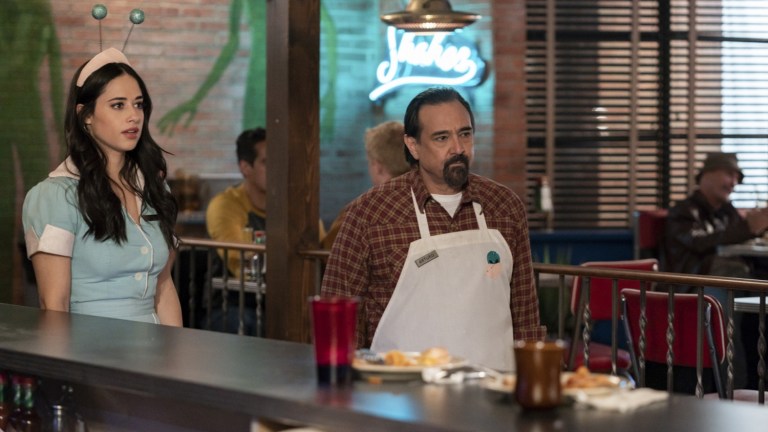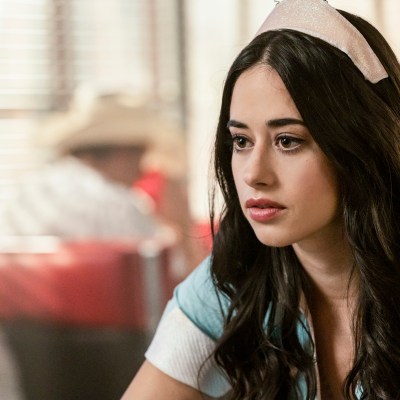Roswell Season 2 Episode 7 Review: Como la Flor
Roswell went long on mothers, trauma, and family lineage in a cathartic episode that showed a path for the season-long story.

THIS ROSWELL REVIEW CONTAINS SPOILERS.
Roswell: Season 2, Episode 7
First, the Roswell writers have finally given us a real development in the ballad of Maria DeLuca’s magic powers, and I for one am thrilled. Not only are her powers as real as we’ve all suspected since the pilot, but Maria is now completely aware of them (as are Michael and Kyle), and they’re connected to the larger mystery involving everyone else’s parents, namely the experiments at Caulfield Prison on Michael’s mother that also give Jim Valenti the cancer that killed him.
As usual, the Roswell writers never miss an opportunity to express the show’s values by dropping in a reference to some real historical or current events. In this case, it’s our country’s long history of medical experiments on Black people, from Henrietta Lacks’ HeLa cells taken without consent to the disturbing Tuskegee Study to the Holmesburg Prison experiments, which most closely track with what Maria’s Grandma Patti experienced in Caulfield Prison. We see this legacy very much alive today, from higher rates of death and complications in maternal health for Black patients to the way that the coronavirus has disproportionately impacted people of color, particularly Black people.
Continuing Roswell’s investigation into matrilineal lines was Helena Ortecho’s return to Roswell. Arturo had contacted her so she could transfer her half of the Crashdown Diner to Liz, who would then sponsor Arturo for his green card. Unfortunately, Liz’s human kryptonite used this opening as an opportunity to show up in person and put her finger in a lot of old wounds.
It’s rare that we see maternal figures with so little redeeming qualities as Helena, and while I doubt we’ve seen the last of her, it would certainly be hard to explain a decade of absence following a lifetime of mistakes driven by a combination of addiction and selfishness.
While Liz likely found it cathartic to finally confront her mother and to feel, once and for all, like she was shutting the door on that relationship, Helena’s visit creates another divide between Rosa and Liz. There’s nothing so heartbreaking as the look on Rosa’s face, having found her mother’s pills in the car, when Liz says she knows her sister can make it, because even Hurricane Helena is 10 years’ sober.
Rosa realistically continues to struggle with everything that led her to addiction in her first life, and the traumatic nature of her and Max’s respective resurrections seems to have only made things worse. Liz has gotten Rosa art supplies and a therapist, but the reality is that Liz needs a lot more than that and right now her support system is incredibly small.
It was good to see Rosa and Isobel finally connecting on a real level, first with training but, more importantly, afterwards with some low-level hijinks and over the shared trauma of Noah’s unique form of violence. Unfortunately, Isobel’s brand of tamping it down to become a woman warrior isn’t exactly compatible with Rosa’s human-ball-of-emotional-fury vibe. While Maria and Rosa briefly spent time together when the secrets were first revealed, the love triangle and the mystery of Mimi DeLuca has monopolized Maria’s screen time.
It would be great to see Rosa get a real confidant who feels more like a peer and prioritizes their relationship. It’s no one’s fault, but right now Rosa is an obligation that the “adults” are largely hot potato-ing around. That’s not sustainable for the character emotionally, nor does it make a ton of sense narratively. Rosa needs primary relationships of her own that are important in their own right, rather than being everyone’s third or fourth priority at best.
There’s a lot of trauma woven into the fabric of Roswell at this point, which is impressive for a show that doesn’t hurt to watch. That’s largely owed to the fact that Roswell doesn’t make us watch every terrible thing that we know has happened to our characters or the people they’re talking about. It also helps that one of the most disturbing villains was a secret from us even as we watched him, so while he raped Isobel, we never “saw” rape, and his crime of inhabiting Rosa and Isobel’s minds is less tangible.
I like that Isobel is trying to parse her trauma versus her brother’s experience – it’s the kind of question we really ask ourselves after experiencing a threat, and particularly after realizing only some of us have PTSD – Isobel’s blackouts and other side effects are surely the alien manifestation of PTSD or C-PTSD, right? Hell, blackouts happen in human PTSD.
Comparing doesn’t help, but Iz doesn’t know that yet. Trauma is random and confusing. It’s interesting that she asks what if trauma isn’t in her soul, but its in her DNA, because there’s some evidence that intergenerational trauma (the kind the DeLucas a decidedly less supernatural Black, Armenian, or Jewish families, for example, experience) really is written into our DNA.
One thing this episode does best is developing a number of individual stories while clearly driving forward the overall theme of investigating parents and origins. We may not know how all these mysteries and earlier generations will connect (though we’re getting a better idea as we move through the season), but the theme and setting make it clear enough that there’s a specific direction we’re aiming for, even if we as audience members don’t know what we’re going to find when we get there.
Other notes
The episode title is, of course, a Selena song, and we also got to hear Bidi Bidi Bom Bom. For the youngs, Selena (no last name needed) was a Mexican-American/Tejana singer who forever changed the game musically, in fashion, and for Latin music in America. She was killed at only 23. Now go listen to all her music and watch the J Lo movie. Selena forever!
That Pixies cover at the end was pretty strong, too – will “Where Is My Mind” ever not be associated with Fight Club?
We finally learned how Maria bought the Stone Pony! Good for her, but also my god, what a heartbreaking story.
Can we talk about the fact that Helena Ortecho came back for Jim Valenti’s funeral – and that’s it? Way to keep your affair secret, Helena.
Has anyone told Max that his boss suspects he murdered Noah? That feels important.
“I mean what does an alien care about human gender constructs?” I enjoy Isobel’s baby gay enthusiasm and casual chat with Guerin about the lesbian manicure.
Isobel paying a Becky tax feels like an important addendum to The Karen Discourse
All three members of the pod squad – oh Kyle Valenti, look at you, giving out cute names and getting to kiss the new woman on the scene!
I feel like there’s more to the story of the ring Helena was after, especially since she made a point of keeping the box.
“Rosa es mi hija, siempre y por toda la vida.” Arturo continues to be the GOAT.
